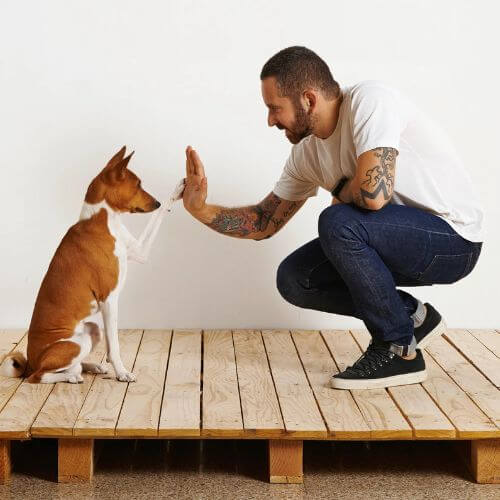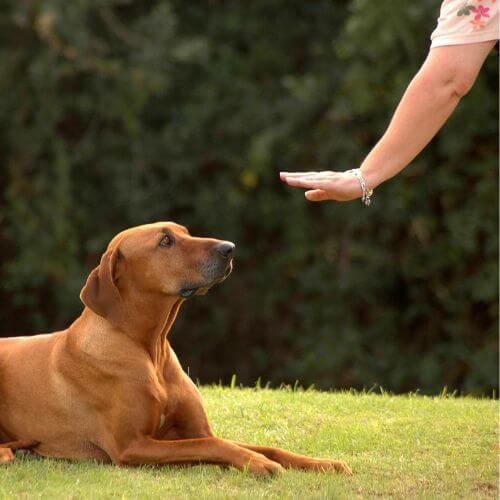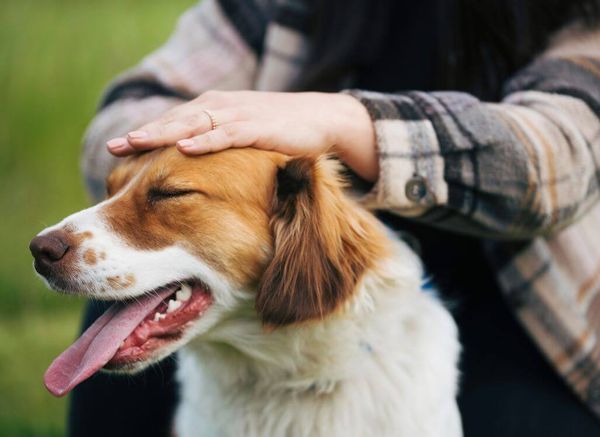Anxiety in dogs is an issue that can manifest in various ways, including behavioral problems. You may notice your dog becoming restless, aggressive, or even destructive when they feel anxious.
There are a plethora of causes for this condition, ranging from genetics to past trauma to environmental factors, and every dog is unique in their needs. And unfortunately, as much as we'd like to help our dogs feel calmer and more relaxed, sometimes our love and attention just aren't enough.
If you think that your dog may be suffering from anxiety, "often the best and most efficient way to resolve your pet’s behavior problems is to seek assistance from a qualified professional". A qualified professional can provide valuable insight into the underlying causes of your dog’s anxiety, as well as recommend appropriate medications, supplements, training, or other treatments to relieve the symptoms.
But in order to seek the right help, you need to understand the roles various professionals can play as part of an effective anxiety management strategy. Let's look at the professionals who can help when dealing with dog anxiety.
Veterinarian

If your dog has developed a behavior problem, the first port of call should be your veterinarian. Veterinarians, or vets as they are often called, are skilled and qualified medical practitioners who specialize in veterinary medicine. They are trained to treat and diagnose an array of ailments and afflictions that affect animals - and that includes your dog.
A veterinarian can "rule out any medical factors that might be contributing to the behavioral signs". Because veterinarians are highly qualified in all aspects of animal behavior and have medical training, they are able to give a diagnosis that addresses both the physical and emotional aspects of your dog's health.
However, if the problem is beyond the expertise of the veterinarian and is not a training or management issue, the case might best be referred to a behaviorist.
Veterinary Behaviorist

Veterinary behaviorists are veterinarians who have specialized in both the medical and physical causes of animal behavior. A Veterinary Behaviorist can not only diagnose a medical condition (if there is one) that causes anxiety or other behavioral problems, but they can also treat behavioral problems due to other causes.
This special designation allows veterinarians to become experts in both the medical and physical causes of animal behavior. According to the American College of Veterinary Behaviorists, "Specialists in veterinary behavioral medicine have both the medical and behavioral knowledge to evaluate cases to determine if there is a medical component. Additionally, specialists determine which medication(s), if any, would be most appropriate as part of an integrated treatment program that includes behavioral modification plans appropriate to the individual patient."
Animal Behaviorist

Animal behaviorists strive to comprehend the reasons that animals behave a certain way and determine what can encourage behavior modification. Applied or Certified Animal Behaviorists can help you grasp why your pet is behaving in specific ways, as well as devise plans for altering those behaviors for the better.
In addition to helping determine the most suitable treatment plan for your pet’s anxiety, a qualified animal behaviorist can also work with you on long-term behavior modification techniques that will help reduce your dog’s anxiety levels.
In most countries, there are set standards for the knowledge and skills required to be a recognized, accredited, or certified professional animal behaviorist. Yet, there are still instances where someone can proclaim themselves to be a behaviorist without possessing the necessary qualifications in this discipline. If you're looking to engage a trainer who identifies as a behaviorist, it is essential that you examine their qualifications in applied animal behavior and any relevant certifications. Investigate them carefully before making your decision!
Certified Dog Trainer

Certified professional dog trainers can possess a whole range of qualifications, acquired through either formal education, practical experience, or both. Certified dog trainers can also offer personalized advice and techniques for training based on your specific dog's needs and personality. A good dog trainer can help owners learn how to effectively communicate with their pets, and make all the difference in their relationship with their furry friend, allowing for a happier, more harmonious household.
While numerous dog trainers offer behavior modification services, simply having a certification in canine training does not make them an expert in behavioral problems. Many certified trainers may not have expertise in diagnosing and treating clinical behavioral conditions, but they are generally excellent resources for teaching basic obedience commands, addressing problem behaviors like aggression or excessive barking, and helping owners understand their pup’s behavior.
Dog Trainer

A dog trainer can help train a dog in a variety of areas, from basic obedience to more advanced skills like agility. Obedience training is seen as an important tool for preventing and managing dog anxiety. Having a disciplined pup is not only beneficial to its overall behavior, but it also makes introducing them to other canines much simpler. Attending obedience courses offers the perfect outlet for your dog to make friends in a safe and structured setting.
That said, if the source of your pup's anxiety is more deeply rooted, training alone may not be enough to address the issue, as they may not have the depth or breadth of knowledge to get to the root cause and solve the behavioral problem.
Surprisingly, there are no laws that govern the dog training business. Consequently, anyone can declare themselves a professional pup trainer without having any prior experience or proper qualifications and still get compensated for their services.
Conclusion:
To practice behavioral medicine, one must have a comprehensive understanding of both the physical and emotional well-being of animals as well as how to help pet owners follow the treatment plan. The terms for professionals used above, as well as the qualifications required to obtain them, may vary from one country to the next, but no matter where you are located, the areas of expertise will be the same. No matter which route you take, it is important to find an animal behavior specialist with the qualifications and experience to help your pet with their behavioral issues.
A word of caution - if your beloved pet is showing symptoms of discomfort or pain, don't wait - get professional medical attention immediately. It's especially important to be vigilant with senior animals as their misbehavior may signal an underlying issue. Don't ignore the warning signs; act fast and ensure that your furry friend stays in top condition!
Also, just because a dog trainer or behavior consultant has credentials doesn't necessarily ensure that they will be an ideal fit for you and your pup. As with any professional decision, take the time to research and find someone who understands your pup’s needs and has a style that works for your pet.
It is also important to recognize that the "diagnosis, treatment, and expected outcome of a behavior problem vary depending on the underlying issue". A qualified animal behavior expert can not only provide a diagnosis but also create an individualized plan for treatment that is tailored to your pet's particular needs. With the right professional onboard, you'll be well on your way toward helping your pet feel more relaxed, secure, and comfortable in any situation!
You may also like:













